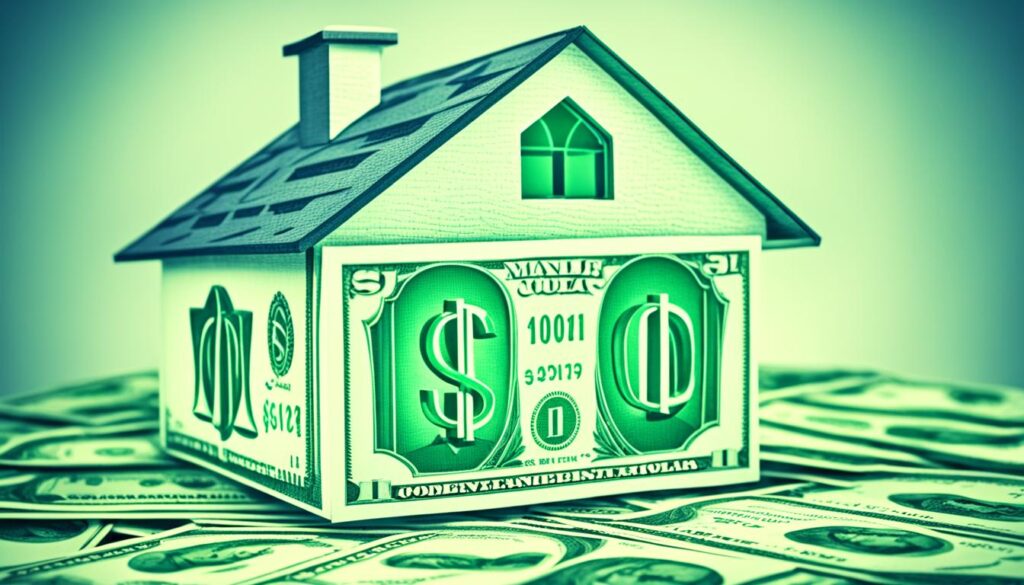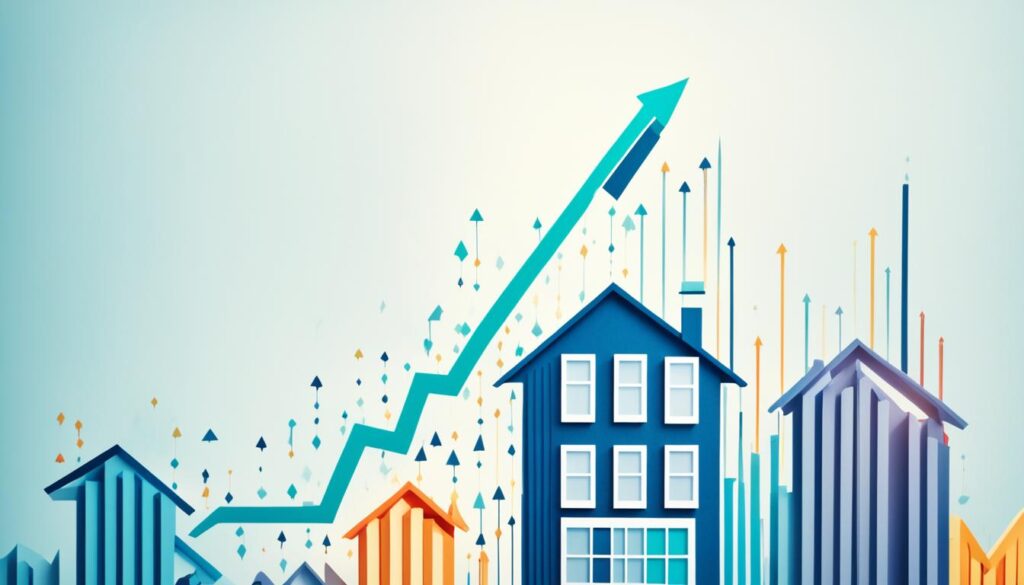Choosing the right home loan is crucial when buying a home. There are many choices, such as fixed-rate and adjustable-rate mortgages. You can also consider options like FHA, VA, and USDA loans.
This article dives into the world of home loans. You’ll learn about the countless types of home loans. Discover what to think about when picking the best mortgage for you.
Figuring out the best home loan early is smart. It will influence the type of home you can buy. Think about everything from mortgage rates to credit score.
Key Takeaways
- Home loans come in various types, including fixed-rate, adjustable-rate, FHA, VA, USDA, jumbo, and conventional mortgages.
- Selecting the right home loan type can help determine the type of home you can afford.
- Factors to consider include mortgage rates, refinancing, pre-approval, down payment, credit score, interest rates, loan terms, closing costs, and debt-to-income ratio.
- The home loan application process can be complex, so understanding the different options is crucial.
- Researching and comparing lenders can help you find the best rates and terms for your specific financial situation and home buying goals.
Introduction to Home Loans
Buying a new home means you need to know your home loan options. The market has many types, from conventional to jumbo. Knowing about these can really help in your home-buying journey.
Importance of Understanding Home Loan Options
Knowing the home loan types out there is key. This helps you pick the right one for your needs and goals. Whether you’re buying your first home or refinancing, knowledge on things like fixed or adjustable rates is crucial.
Overview of the Different Types of Home Loans
There are many mortgage options, like conventional or government-backed loans. They also include jumbo loans. Each type has its requirements and features.
Conventional Mortgages

Conventional mortgages are the most common type of loan for buying a home. They do not come with government insurance. This makes them different from FHA, VA, or USDA loans. There are two types: conforming loans and non-conforming loans. Conforming loans meet Fannie Mae and Freddie Mac’s rules. But if a loan is too big, it’s non-conforming or a jumbo loan. Jumbo loans are harder to get.
Conforming and Non-Conforming Loans
Fannie Mae and Freddie Mac set rules for conforming loans. They buy and sell most of these loans. There’s a limit on how big a conforming loan can be. Anything bigger is called a jumbo loan. Getting a jumbo loan is tougher than getting a conforming one.
Eligibility Requirements
To get a conforming mortgage, you often need a 620 credit score and a DTI up to 50%. These are the basic requirements. For non-conforming (jumbo) loans, you’ll need better credit and other things. They’re harder to qualify for.
Down Payment and Private Mortgage Insurance
You can get a home with just a 3% down payment if you’re buying for the first time, or 5% if you’ve owned before. If your down payment is less than 20%, you’ll pay private mortgage insurance (PMI). This insurance helps your lender if you can’t pay your loan. After you’ve paid off 20% of your home, you can ask to stop paying PMI.
Fixed-Rate Mortgages
A fixed-rate mortgage offers stability and predictability for many buyers. The interest rate doesn’t change during the loan’s life. This means your monthly payments stay the same, no matter market changes.
Consistent Monthly Payments
Fixed-rate mortgages make monthly payments consistent. Unlike adjustable-rate mortgages, they won’t increase over time. This brings peace of mind for predictable payments. It’s great for long-term budgeting and financial plans.
Long-Term Budgeting Benefits
Living in your home for a long time? A fixed-rate mortgage helps with long-term budgeting. You won’t have to worry about your payment changing. This makes managing your money and planning for the future easier.
Potential Higher Interest Rates
Yet, fixed-rate mortgages may have higher interest rates than adjustable ones. This is especially true when overall rates are low. So, you might end up paying more interest. It’s an important factor to think about.
Adjustable-Rate Mortgages (ARMs)

An adjustable-rate mortgage (ARM) is different from a fixed-rate mortgage. It’s a 30-year loan with an interest rate that changes. This change depends on the market. At first, you agree to a fixed rate for 5, 7, or 10 years. Then, the rate changes based on what’s happening in the mortgage market.
Initial Fixed-Rate Period
At the beginning, an ARM gives you a fixed rate for a few years. This means your monthly payment stays the same. It’s good if you plan to move or upgrade soon. You get to pay a lower interest rate at the start, before it might go up.
Rate Adjustment Mechanisms
When the fixed-rate time is over, your interest rate can change yearly or every six months. The new rate is figured out by adding a set amount to a market index, like the Constant Maturity Treasury (CMT) index. Or, it could be the London Interbank Offered Rate (LIBOR). This way, your rate can go up or down based on the overall market rates.
Rate Caps and Risks
ARMs are protected by rate caps. These caps limit how much your rate can change at one time or over the life of the loan. Even though ARMs start with maybe lower rates than fixed mortgages, your payments could get higher. Make sure you think about how you’ll handle rate changes before choosing an ARM.
Home loans

Government-backed loans are a safe choice. They’re insured by the FHA, VA, and USDA. FHA, VA, and USDA loans need less and offer more to buyers than regular ones.
FHA Loans: Requirements and Benefits
FHA loans are great for first-timers or those with moderate incomes. You can buy a home with a credit score of 580 or more and only 3.5% down. Even if your score is between 500 and 579, you can still get a loan. Just be ready to put down 10%.
If you choose an FHA loan, your mortgage insurance is lower. This makes your monthly payments more affordable.
VA Loans: Eligibility for Veterans and Service Members
VA loans, serving our military, are guaranteed by the VA. Active military, veterans, and their spouses can benefit. These loans allow $0 down and have lower interest rates.
For VA loans, you need to meet certain service conditions. For example, you must have served 90 days during war or 181 days in peace.
USDA Loans: Rural Development and Eligibility
USDA loans aim to help those with low to moderate incomes buy homes in rural or suburban places. They require no down payment. Also, their mortgage insurance is less than FHA loans.
To be eligible for a USDA loan, you must fit within income limits. Your home purchase has to be in an eligible rural spot.
Jumbo Loans

When you need to finance a high-value property, think about jumbo loans. They go beyond the conventional loan limits set by some big companies. Jumbo loans help you buy homes that are more expensive than usual in your area.
Financing High-Value Properties
Looking to buy a luxury home or one that’s too pricey for a regular loan? Consider a jumbo loan. They’re great for buying expensive houses, vacation spots, or investment properties. These all might cost more than a standard loan can cover.
Strict Qualification Requirements
Getting a jumbo loan is tougher than a regular mortgage. Lenders ask for a higher credit score, a smaller debt compared to your income, and a bigger down payment. You must meet these tough requirements for high-end property financing.
Larger Down Payment Needs
Jumbo loans differ from normal mortgages in down payment terms. You’ll need to put down at least 20% of the home’s price. This sizeable down payment is to lower the risk when financing expensive properties.
| Loan Type | Conforming Loan Limit | Down Payment Requirement | Credit Score Minimum | DTI Ratio Limit |
|---|---|---|---|---|
| Conventional Loan | $726,200 (2023) | 3-20% | 620 | 50% |
| Jumbo Loan | Exceeds $726,200 (2023) | 20% or more | 700+ | 43% or lower |
Home Equity Loans and Lines of Credit

Home equity loans and HELOCs help homeowners get money using their property’s equity. You can borrow money for different things like making your home better or paying off debt. Your home is used as a promise that you’ll pay the money back.
Using Home Equity as Collateral
With these loans, your home’s equity is what the money you borrow is based on. It’s the difference between your home’s value and what you still owe. This way of borrowing is seen as less risky for lenders. Because of this, you might get lower interest rates and better terms than with other loans.
Home Equity Loans vs. Home Equity Lines of Credit
Home equity loans and HELOCs are similar but work in different ways. A home equity loan gives you a set amount all at once. It has a fixed interest rate and you pay it back over time. A HELOC is more like a credit card. It gives you a credit limit you can dip into as needed. The interest rates can change.
Your choice depends on what you need. If you have one big expense coming up, a home equity loan might be best. But if you need money here and there for different things, a HELOC could be more helpful. It gives you flexibility.
Reverse Mortgages
Reverse mortgages allow senior citizens to change their home equity into cash. This can help seniors when they need more money for living expenses or other costs. But, seniors must fully understand what a reverse mortgage offers and its risks before they choose this option.
Converting Home Equity into Cash
A reverse mortgage is for homeowners 62 years old and over. Instead of paying their mortgage each month, they can choose to receive money in different ways. They might get a one-time payment, regular payments, or even set up a line of credit they can use when necessary. For those retired, this could mean making their home equity work for them, giving them more financial freedom.
Eligibility for Seniors
To qualify for a reverse mortgage, a homeowner must be 62 or older. They should also have a sizable amount of their mortgage paid off, or own their home completely. Lenders look at the homeowner’s credit score, income, and home value too. It’s important for seniors to think about these things to see if a reverse mortgage is a good fit for them.
Comparing Mortgage Rates and Lenders
When you’re looking to get a home loan, comparing mortgage rates and lenders is key. Many things can affect the rates you see. This includes the housing market, Federal Reserve policies, your credit score, and the loan type.
Factors Influencing Mortgage Rates
Mortgage rates can change depending on the big economic picture and your personal finances. They also vary with the type of loan you’re considering. Knowing this can point you toward the best choice when comparing mortgage rates. The housing market’s status, Federal Reserve actions, your credit score, and your loan type all affect the interest rates you might get.
Shopping for the Best Rates and Terms
Getting the best deal means checking out several lenders. You should talk to banks, credit unions, and brokers to compare what they offer. By doing this, you can secure a loan that fits your financial needs and home buying plans. This can save you a lot of money over the loan’s life.
The Home Loan Application Process
Starting the home loan process is key if you’re looking to own a home. Knowing about mortgage pre-approval and documentation requirements for home loans makes things easier. It helps you get the right mortgage for you.
Pre-Approval and Documentation Requirements
Getting pre-approval from a lender kicks things off. You share your credit score, income, and assets. The lender then figures out the maximum loan you can get. You need to show documents like tax returns, pay stubs, and bank statements.
Credit Score and Income Verification
Lenders check your credit score requirements for home loans and income verification. They want to know you can handle mortgage payments on time. Most loans need a credit score of at least 620, while some loans need less.
Understanding the Debt-to-Income Ratio
Know about the debt-to-income ratio (DTI) too. It shows how much of your income goes to bills, including a mortgage. Keeping your DTI below 43% can help you get a better loan deal.
Also Read: Get A Business Loan No Personal Guarantee Needed
Conclusion
The home loan world is broad and deep, offering many choices. You can find everything from regular mortgages to special types like jumbo loans and reverse mortgages. It’s important to learn about each option. This way, you can pick what fits best with your financial situation.
When looking at home loans, think about interest rates, how much you need to put down, and your credit score. By comparing what different lenders offer and getting advice from experts, you can choose wisely. This choice can help you buy your first home or refinance your current one with confidence.
Your pick for a home loan should match your goals and how much risk you’re okay with. This is true whether you’re a first-time buyer, you’ve been around the block, or you’re wanting to use your home’s equity. With many loan options, you can find one that helps you live out your dreams of owning a house.
FAQs
What are the different types of home loans available?
Home loans have many types, such as fixed-rate and adjustable-rate. There are also FHA, VA, USDA, jumbo, and conventional mortgages. Each is designed for various financial and property needs.
What is the difference between conventional and government-backed loans?
Conventional loans are common and come without government insurance. They have stricter credit and debt-to-income requirements. Conversely, government-backed loans like FHA, VA, and USDA offer lower requirements thanks to backing by government agencies.
What are the benefits of a fixed-rate mortgage?
A fixed-rate mortgage keeps your interest rate and monthly payment the same over the loan’s life. This consistency is ideal if you plan to stay in your home long term.
How do adjustable-rate mortgages (ARMs) work?
ARMs start with a fixed rate that can change based on the market. They typically stay fixed for 5, 7, or 10 years. ARM loans include caps to prevent your rate from growing too high.
Who is eligible for a reverse mortgage?
Seniors aged 62 and older with a lot of equity in their homes can get a reverse mortgage. This lets them turn their home’s equity into cash.
What factors influence mortgage rates?
Several things impact mortgage rates. Housing market conditions, Federal Reserve policies, your credit score, and the chosen loan type all play a part.
What is the home loan application process like?
First, you get pre-approved. Then, you’ll submit your documents for credit and income checks. Lenders will also look at your debt-to-income ratio to see if you qualify.
Source Links
- https://www.consumerfinance.gov/owning-a-home/explore/understand-the-different-kinds-of-loans-available/
- https://www.rocketmortgage.com/learn/types-of-mortgages
- https://www.bankrate.com/mortgages/types-of-mortgages/